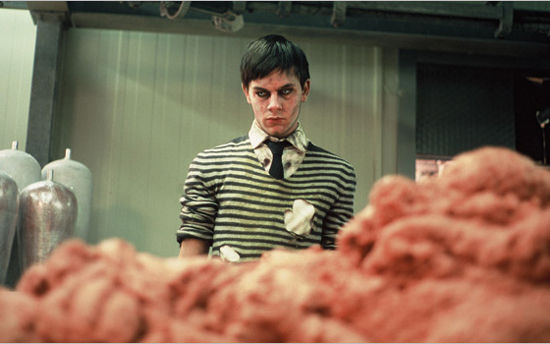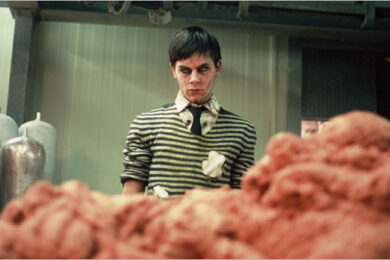Although we tend to think of real innovation in cinema coming mostly from art house, auteurs and theorists, it’s wise not to forget the equally important role of the pulp genres in pushing boundaries. These were some of the first places where drugs, violence and sexuality got by the censors (because they probably saw pulp films as marginal and thus unimportant); the first, albeit highly problematic, attempts to let minorities tell their own stories were exploitation films; and even the French New Wave, the very definition of innovation, drew heavily not on high-brow art films and paintings, but on film noir and American melodramas.
But horror especially has a history of even more provocative transgressions. More so than any other genre, horror — like its partner in crime, sci-fi — is capable of getting away with the most incisive political commentary: think of Night of the Living Dead‘s racial politics and They Live‘s clever critique of Globalization, to name just two. Even homosexuality, de Sade-style kinky sex and softcore porn elements worked their way into Hammer Horror films early doors. All this contraband was delivered with a ironic sneer or even a laugh, intentional or otherwise. True horror fans expect to have their morals and tolerance tested while being entertained and scared shitless.
What’s clear as soon as you start watching Lesbian Vampire Killers is that James Corden and Mathew Horne do not love horror — they like Nuts TV and derivative, straight-to-video National Lampoon frat-boy comedies, which is what this travesty essentially is. At least Shaun of the Dead, for what it’s worth, was a spoof made by fans of horror for fans of horror. However, Shaun inadvertently ushered in a new era for the horror-comedy by creating a hybrid that had it both ways — gory and funny in equal measures. Since then, there has been a crop of mostly British, mostly commercial imitators including The Cottage and Black Sheep. While Lesbian Vampire Killers tries vainly to jump on this dubious bandwagon it is blatantly obvious that they are interlopers in the land of horror.
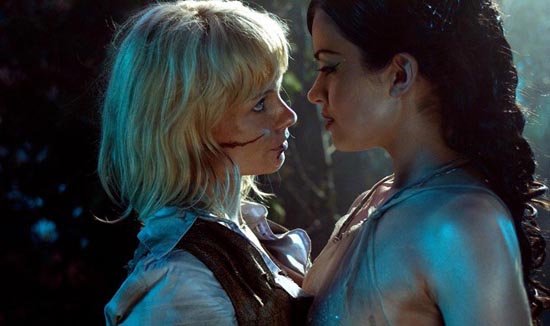
They betray their name-sake, Polanski’s The Fearless Vampire Killers, by being both less sexy and less funny. They try to create a pastiche of Coppola’s slutty vampire babes in Bram Stoker’s Dracula but manage to make them even more awkward. It even fails as a buddy comedy, as the presence of Paul McGann (the I in Withnail and I) serves to constantly remind us of what a good buddy film is really like. But it mostly betrays horror by not pushing any boundaries in terms of style or content: heavy petting instead of sex, family-friendly ectoplasm instead of blood, bi-curious Katy Perry ‘lesbians’ instead of the real deal.
So instead of wasting our time on lesbian vampires, let’s talk about gay zombies. The Horne-Corden vehicle begs an obvious comparison with another homosexual horror homage by the name of Otto; or, Up With Dead People. This underrated gem by Canadian director Bruce LaBruce (The Rasberry Reich) is part horror spoof and part softcore gay porn. Otto cleverly lifts the concept of Shadow of the Vampire: a comically pretentious feminist filmmaker named Medea is working on a film about gay revolutionary zombies — "insurgent sissies from beyond the grave!" — when she accidentally casts a real zombie in the lead role. This leads to countless gags which riff both on the excesses of gay culture and the solipsism of political filmmakers. For those still looking for lesbians, Otto has them too — Medea has a lesbian lover who is inexplicably trapped in a silent film and communicating through subtitles.
The idea that in the near future dressing up as zombies has become an underground gay fetish is a seemingly facile yet actually quite effective analogy for the cruising lifestyle — the brainless quest for flesh and the danger of STDs that goes with it, the idea that straight men could ‘catch’ homosexuality like a virus plays on a common homophobic fear. But the zombie conceit also draws attention to the marginalisation and downright revulsion directed at the gay community by the mainstream of society. As the director himself notes, the relationship between homosexual sex and sadism is a fascinating one which is not explored by the majority of more acceptable, sanitised forms of gay pop culture.
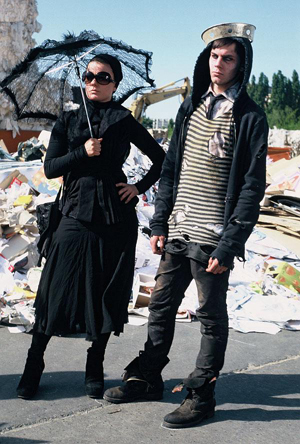
Otto’s blank stare and silly walk are played for laughs but as he begins to recollect who he was before he was undead (a vegetarian butcher with a boyfriend?) he becomes a surprisingly endearing character, something that a well-placed Antony and the Johnsons track helps to cement. Medea’s character is a self-deprecating joke by the director, externalising the side of himself which might find himself reading Marcuse in the park. The multiple levels of irony, in which each character is simultaneously a stereotype and sympathetic and each line is both a joke and a political statement, could only be the product of a North American hipster’s mind. The film has a Vice Magazine tone (LaBruce is a sometimes contributor) which is both trashy and pretentious; yet the craftsmanship, on such an obviously low budget, is simply astounding. He wrestles vibrant colours out of HD digital video and the inventive sound design immediately makes you feel like you’re in your own zombie haze.
It’s clear that Bruce LaBruce loves and understands horror. The B-movie-style stilted delivery of the actors makes their ironic lines even funnier. The uncomfortable mix of humour and gore and sex is pure pulp pastiche. Above all, he understands the central role of gimmicks in horror films. The gimmick in place here (gay zombies) is meant to draw in the baffled punters, and once they’re in the cinema, LaBruce can have his way with them.
Horror films need to shock to stay relevant. For the heterosexual viewer the effect of having gay porn (or really any very graphic porn) forced on you is a bit like the taboo excitement-discomfort of watching your first slasher flick. Which is not to say that the gay love scenes are particularly horrific or even outré, just unfamiliar to the mainstream straight viewer. The joy of a good horror film is exactly that mix of fun and revulsion, being made temporarily uncomfortable as you try to make sense of what you’re watching. If the most recent innovation in horror has been the torture porn of Saw I-V, then real porn is clearly the next frontier.
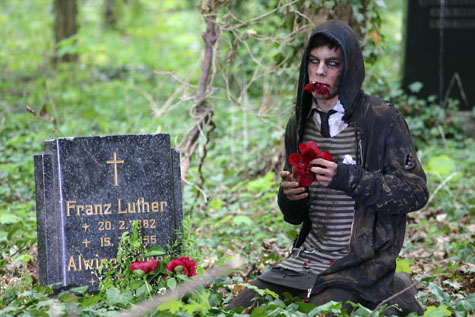
Now I’m not saying that Horne and Corden should have read more queer theory and been more PC (Otto is anything but). But they should have, at least, been original. Otto is a true horror classic and deserves many imitators, whereas Lesbian Vampire Killers will be buried quickly under a mass of used tissues.

